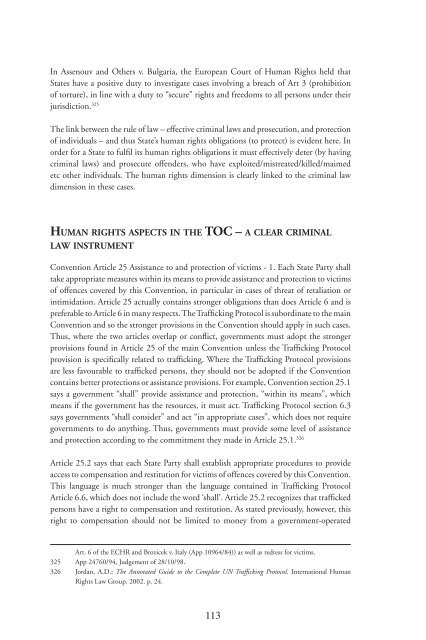Trafficking in human beings: human rights and ... - unesdoc - Unesco
Trafficking in human beings: human rights and ... - unesdoc - Unesco
Trafficking in human beings: human rights and ... - unesdoc - Unesco
Create successful ePaper yourself
Turn your PDF publications into a flip-book with our unique Google optimized e-Paper software.
In Assenouv <strong>and</strong> Others v. Bulgaria, the European Court of Human Rights held that<br />
States have a positive duty to <strong>in</strong>vestigate cases <strong>in</strong>volv<strong>in</strong>g a breach of Art 3 (prohibition<br />
of torture), <strong>in</strong> l<strong>in</strong>e with a duty to “secure” <strong>rights</strong> <strong>and</strong> freedoms to all persons under their<br />
jurisdiction. 325<br />
The l<strong>in</strong>k between the rule of law – effective crim<strong>in</strong>al laws <strong>and</strong> prosecution, <strong>and</strong> protection<br />
of <strong>in</strong>dividuals – <strong>and</strong> thus State’s <strong>human</strong> <strong>rights</strong> obligations (to protect) is evident here. In<br />
order for a State to fulfi l its <strong>human</strong> <strong>rights</strong> obligations it must effectively deter (by hav<strong>in</strong>g<br />
crim<strong>in</strong>al laws) <strong>and</strong> prosecute offenders, who have exploited/mistreated/killed/maimed<br />
etc other <strong>in</strong>dividuals. The <strong>human</strong> <strong>rights</strong> dimension is clearly l<strong>in</strong>ked to the crim<strong>in</strong>al law<br />
dimension <strong>in</strong> these cases.<br />
HUMAN RIGHTS ASPECTS IN THE TOC – A CLEAR CRIMINAL<br />
LAW INSTRUMENT<br />
Convention Article 25 Assistance to <strong>and</strong> protection of victims - 1. Each State Party shall<br />
take appropriate measures with<strong>in</strong> its means to provide assistance <strong>and</strong> protection to victims<br />
of offences covered by this Convention, <strong>in</strong> particular <strong>in</strong> cases of threat of retaliation or<br />
<strong>in</strong>timidation. Article 25 actually conta<strong>in</strong>s stronger obligations than does Article 6 <strong>and</strong> is<br />
preferable to Article 6 <strong>in</strong> many respects. The Traffi ck<strong>in</strong>g Protocol is subord<strong>in</strong>ate to the ma<strong>in</strong><br />
Convention <strong>and</strong> so the stronger provisions <strong>in</strong> the Convention should apply <strong>in</strong> such cases.<br />
Thus, where the two articles overlap or confl ict, governments must adopt the stronger<br />
provisions found <strong>in</strong> Article 25 of the ma<strong>in</strong> Convention unless the Traffi ck<strong>in</strong>g Protocol<br />
provision is specifi cally related to traffi ck<strong>in</strong>g. Where the Traffi ck<strong>in</strong>g Protocol provisions<br />
are less favourable to traffi cked persons, they should not be adopted if the Convention<br />
conta<strong>in</strong>s better protections or assistance provisions. For example, Convention section 25.1<br />
says a government “shall” provide assistance <strong>and</strong> protection, “with<strong>in</strong> its means”, which<br />
means if the government has the resources, it must act. Traffi ck<strong>in</strong>g Protocol section 6.3<br />
says governments “shall consider” <strong>and</strong> act “<strong>in</strong> appropriate cases”, which does not require<br />
governments to do anyth<strong>in</strong>g. Thus, governments must provide some level of assistance<br />
<strong>and</strong> protection accord<strong>in</strong>g to the commitment they made <strong>in</strong> Article 25.1. 326<br />
Article 25.2 says that each State Party shall establish appropriate procedures to provide<br />
access to compensation <strong>and</strong> restitution for victims of offences covered by this Convention.<br />
This language is much stronger than the language conta<strong>in</strong>ed <strong>in</strong> Traffi ck<strong>in</strong>g Protocol<br />
Article 6.6, which does not <strong>in</strong>clude the word ‘shall’. Article 25.2 recognizes that traffi cked<br />
persons have a right to compensation <strong>and</strong> restitution. As stated previously, however, this<br />
right to compensation should not be limited to money from a government-operated<br />
Art. 6 of the ECHR <strong>and</strong> Brozicek v. Italy (App 10964/84)) as well as redress for victims.<br />
325 App 24760/94, Judgement of 28/10/98.<br />
326 Jordan, A.D.: The Annotated Guide to the Complete UN Traffi ck<strong>in</strong>g Protocol. International Human<br />
Rights Law Group. 2002. p. 24.<br />
113

















